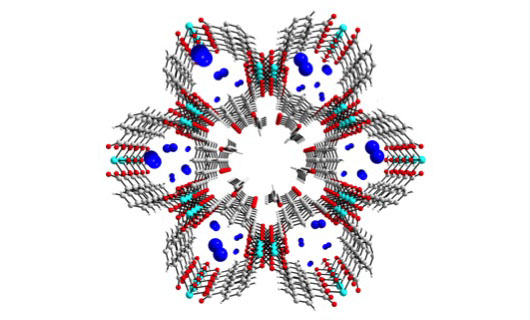Scientists explore the health benefits of toxic gases

Researchers at Scotland’s oldest and youngest universities have teamed up to explore the potential of exciting new gas-releasing materials for medical applications.
Chemists at the University of St Andrews, led by Professor Russell Morris, will design and make a range of new materials, called metal-organic frameworks, which are filled with tiny cavities that act like miniature gas tanks to store medically important gases.
Surprisingly, the gases in question – carbon monoxide, hydrogen sulfide and nitric oxide – are usually considered to be highly poisonous, but they are also made in small quantities in the body. When released in the right amount and the right place, they can protect against the disease processes that lead to heart attacks and strokes.
Once made, the materials will be tested by the team in the Department of Diabetes and Cardiovascular Science at the new University of the Highlands and Islands, led by Professor Ian Megson, to determine what effects the gases released have on blood vessel function and blood clotting processes.
Professor Morris, a Royal Society Wolfson Merit Award Holder, commented, “This is an extremely exciting project that brings the field of materials chemistry squarely into the medical research arena. The exquisite chemistry of metal-organic framework materials gives us the opportunity to develop a wide range of products with different applications in cardiovascular disease.”
Professor Megson at the University of the Highlands and Islands added, “This is a highly innovative collaboration between chemists and biomedical scientists with a view to rapid translation of lab-based discoveries into products to meet a clinical need. Our job is to use the different materials supplied by St Andrews to find out the ideal characteristics to be useful in the fight against heart disease.”
The work has attracted £288,000 from the British Heart Foundation New Horizons initiative to fund a three year project across the two universities.
Professor Jeremy Pearson, associate medical director at the British Heart Foundation, said: “We are delighted to announce an award of almost £300,000 for this fascinating research project which is opening up new possibilities for people who have had a procedure called angioplasty to open up blocked coronary arteries.
“Angioplasty is a common procedure in Scotland and it’s safe, but patients who have had an angioplasty need to take medication to prevent blood clots forming in the arteries afterwards.
“The ingenious solution from this team of scientists is to try to develop a new technology to deliver soothing gases to the affected arteries after treatment. In large amounts these gases are harmful, but in small doses they actually have a beneficial effect. We hope to harness the calming effect of these gases for the benefit of patients in the future.”
ENDS
Note to Editors
Professor Russell Morris is available for interview on 07751 579252 or email [email protected].
For UHI contact Susan Szymborski, Communications officer on Tel: 01463 279222 or email: [email protected].
The British Heart Foundation (BHF) is the nation’s heart charity, dedicated to saving lives through pioneering research, patient care, campaigning for change and by providing vital information. But we urgently need help. We rely on donations of time and money to continue our life-saving work. Because together we can beat heart disease. For more information, visit bhf.org.uk/pressoffice
Category University news